Books by Joseph Mai
The Cinema of Rithy Panh: Everything Has a Soul, 2021
The Cinema of Rithy Panh: Everything Has a Soul, 2021
Co-Edited volume
Contributions by Stephanie Benzaquen-Gautier, Jennifer Cazenave, Lindsay Fren... more Co-Edited volume
Contributions by Stephanie Benzaquen-Gautier, Jennifer Cazenave, Lindsay French, Rachel Harrison, John Kleinen, David LaRocca, Boreth Ly, Raya Morag, Soko Phay, Donald Reid, Vicente Sánchez-Biosca, Jack A. Yeager, Cathy J. Schlund-Vials, Khatharya Um
https://www.rutgersuniversitypress.org/the-cinema-of-rithy-panh/9781978809796
http://www.manchesteruniversitypress.co.uk/9780719096471/
Intervening at the crossroads of philo... more http://www.manchesteruniversitypress.co.uk/9780719096471/
Intervening at the crossroads of philosophy, politics, and cinema, this book argues that the career of Robert Guédiguian, director of Marius et Jeannette (1997) and other popular auteurist films, can be read as an original and coherent project: to make a committed, historically-conscious cinema with friends, in a local space, and over a long period of time. Illustrated with comprehensive readings of all of Guédiguian's films.
CALL FOR PAPERS by Joseph Mai
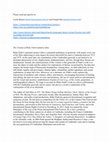
The Cinema of Rithy Panh (tentative title) Rithy Panh¹s cinematic project offers a sustained medi... more The Cinema of Rithy Panh (tentative title) Rithy Panh¹s cinematic project offers a sustained meditation on genocide, with nearly every one of his films addressing to some degree the horror that befell his native Cambodia between 1975 and 1979. At the same time, his examination of the Cambodian genocide is not limited to its attendant phenomena of war, displacement, dehumanization, and loss, though these themes are fundamental. Instead, the central premise of this volume is that genocide in Panh¹s work is at once the object of study and the catalyst for explorations of themes occasioned by, but that also surpass, the brutal reign of Democratic Kampuchea. Among these, we find reflections on rites and rituals, legality and governance, human rights, colonialism, global capitalism, and sexual exploitation, to name but a few. Moreover, as a cinematic art, Panh¹s work explores the intersection of aesthetics and violence, ethics, and memory, encouraging discussion of framing and editing, the mise-en-scène of voice and testimony, the use of visual archives and animation, and the visual and narrative establishment of point-of-view (e.g., of the victim, perpetrator, or autobiographical subject). We hope to account for Rithy Panh¹s work as a direct confrontation with the Cambodian genocide and its causes, but also as a creative exploration of the continuation of life in its aftermath.
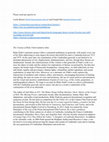
The Cinema of Rithy Panh (tentative title) Rithy Panh¹s cinematic project offers a sustained medi... more The Cinema of Rithy Panh (tentative title) Rithy Panh¹s cinematic project offers a sustained meditation on genocide, with nearly every one of his films addressing to some degree the horror that befell his native Cambodia between 1975 and 1979. At the same time, his examination of the Cambodian genocide is not limited to its attendant phenomena of war, displacement, dehumanization, and loss, though these themes are fundamental. Instead, the central premise of this volume is that genocide in Panh¹s work is at once the object of study and the catalyst for explorations of themes occasioned by, but that also surpass, the brutal reign of Democratic Kampuchea. Among these, we find reflections on rites and rituals, legality and governance, human rights, colonialism, global capitalism, and sexual exploitation, to name but a few. Moreover, as a cinematic art, Panh¹s work explores the intersection of aesthetics and violence, ethics, and memory, encouraging discussion of framing and editing, the mise-en-scène of voice and testimony, the use of visual archives and animation, and the visual and narrative establishment of point-of-view (e.g., of the victim, perpetrator, or autobiographical subject). We hope to account for Rithy Panh¹s work as a direct confrontation with the Cambodian genocide and its causes, but also as a creative exploration of the continuation of life in its aftermath.
Journal Articles and Book Chapters by Joseph Mai
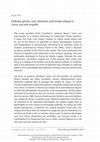
Contemporary French Civilization, 2023
This essay considers Julien Cernobori’s “podcast fleuve,” Cerno, une
anti-enquête, as a creative ... more This essay considers Julien Cernobori’s “podcast fleuve,” Cerno, une
anti-enquête, as a creative alternative to mainstream media practices.
It draws first from Yves Citton’s analysis of critical media theory and
its use of the lexicon of spectrality to figure derealization, passivity,
and manipulation. A documentary reworking of an infamous series of
murders committed by Thierry Paulin in the 1980s, Cerno is haunted
by ghosts familiar to the French mass media. The essay emphasizes the
themes of attention and expression in the ordinary language and care
philosophy developed in France by Sandra Laugier. Through this dual
perspective, Cernobori’s original use of the podcast form comes into
focus as a critique of the media’s use of the specters (ghosts, or zombies),
and as the elaboration of a form of attention that sensitizes its listening
public to the vulnerability and expression of those who have lacked voice
and care.
Cet essai se propose d’analyser Cerno, une anti-enquête, un «podcast
fleuve» produit par Julien Cernobori, comme l’aboutissement d’une
démarche originale dans le paysage des médias de masse. Ce travail
s’inspire d’abord de l’analyse de la théorie critique des médias que propose
Yves Citton. Ce dernier s’intéresse au lexique de la spectralité pour figurer
les effets de déréalisation, de passivité, et de manipulation. Documentaire
réinventé d’une fameuse série de meurtres commise par Thierry Paulin
dans les années 1980, Cerno est hanté par des fantômes qui sont familiers
aux médias de masse. Le présent essai s’intéresse également aux thèmes
de l’attention et de l’expression développés par Sandra Laugier dans la
philosophie du soin («care») et du langage ordinaire. Au travers de cette
double perspective, ce podcast très original propose, d’une part, une
critique de la façon dont les médias font usage des spectres (fantômes, ou
zombies) de Paulin et de ses victimes; d’autre part, le podcast développe
aussi une forme d’attention qui sensibilise son nouveau public à la
vulnérabilité et à l’expression de ceux et celles, souvent dépourvu.e.s de
soin, qui n’ont pas souvent de voix.
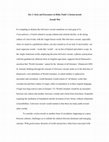
It is tempting to dismiss the littérature-monde manifesto as a last gasp of la Francophonie, a Fr... more It is tempting to dismiss the littérature-monde manifesto as a last gasp of la Francophonie, a French refusal to accept cultural and colonial decline, or the dying embers of a lost rivalry with the Anglo-Saxon world. But littérature-monde, especially when we stand in a globalised culture, can also remind us of our lack of universality: our most capacious words -words like 'world' -are in fact of limited and relative scope. In the Anglo-American world, employing the term littérature-monde, a phrase synonymous with but qualitatively different from its English equivalent, supports David Damrosch's assertion that 'World Literature' cannot be the 'plenum of all literature' (Damrosch 2003: 4). Instead, thinking through the concept of littérature-monde sends us in the direction of Damrosch's own definition of World Literature, in which totality is replaced by encounter and circulation: world literature would consist of 'all literary works that circulate beyond their culture of origin, either in translation or in their original language (Virgil was long read in Latin in Europe)' (5). World Literature would be an encounter between one culture and another, between a reader and a book from elsewhere, frequently requiring the mediation of translation and the invention of new forms, without exhaustion of possibilities. Littérature-monde would remind us that there are many paths toward other worlds.
A rough version of an essay on teaching Les Misérables.
Mosaic 2016
In Que font les rennes après Noël ? (2010) Olivia Rosenthal splices an intimate autobiographical ... more In Que font les rennes après Noël ? (2010) Olivia Rosenthal splices an intimate autobiographical narrative together with various, at first seemingly unrelated texts about animals. This essay explores ways in which her formal experiment unsettles conventional (anthropocentric and patriarchal) discourses and practices that have traditionally shaped the border between humans and animals. It considers some of the ethical and aesthetic implications of this commitment to writing.

Studies in the Novel, 2014
This essay reinterprets Kundera’s best-known novel through philosophical considerations of vulner... more This essay reinterprets Kundera’s best-known novel through philosophical considerations of vulnerability and the human/animal relationship. It begins with an understanding of irony—associated with Cora Diamond’s notion of embodiment shared by humans and animals—as a counter to Cartesian mastery of nature. It turns to the denial of embodiment through shame and disgust, as theorized by Martha Nussbaum and illustrated with several characters. One main character, Tereza, stands out against a normotic backdrop of human disembodiment (which Kundera calls kitsch). Her acceptance of vulnerability and encounter with shame gradually envelop her spouse, Tomas, as well. The final section examines the novel’s closing pastoral passages, in which a thorough investigation of human and nonhuman animality takes place, leaving the reader somewhere between an extremely empathetic Tereza and a sympathetic but gently skeptical narrator. It describes the novel as a “fallen idyll” where human vulnerability and shame can be expressed and considered.

New Review of Film and Television Studies, 2011
This paper explores the possibilities of Emmanuel Levinas's philosophical description of the ethi... more This paper explores the possibilities of Emmanuel Levinas's philosophical description of the ethical life for understanding the experience of viewing a film, and this with two related goals in mind. The first is to provide a sustained Levinasian reading of the Dardenne Brothers' Lorna's Silence as an alternative to political or traditionally ethical approaches. This is necessary because the sensuous quality of Lorna's moral conversion is best understood through a set of metaphors used by Levinas to describe his ‘pre-ontological’ ethical philosophy: metaphors of the caress, the feminine and maternity. A second goal is to account for how this film's formal qualities create an encounter between viewer and film that echoes Lorna's encounters in the fictional world. To this end, the paper squares Levinasian ethics with André Bazin's realism by trimming from Bazin's work the notion of a gathered, individual subjectivity and emphasizing themes of encounter and dislocation. Lorna's Silence gives a fresh illustration of the cinema's power to encourage viewers to strive toward an altruistic notion of human relations.
Studies in French Cinema, 2007
Reviews and shorter publications by Joseph Mai
Contemporary French Civilization
Mekong Review, 2018
Review of Rithy Panh's film "Graves Without a Name."
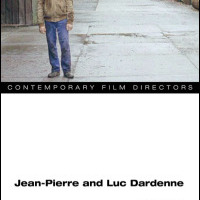





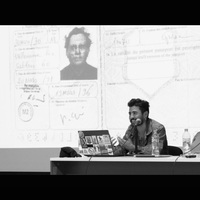



Uploads
Books by Joseph Mai
Contributions by Stephanie Benzaquen-Gautier, Jennifer Cazenave, Lindsay French, Rachel Harrison, John Kleinen, David LaRocca, Boreth Ly, Raya Morag, Soko Phay, Donald Reid, Vicente Sánchez-Biosca, Jack A. Yeager, Cathy J. Schlund-Vials, Khatharya Um
https://www.rutgersuniversitypress.org/the-cinema-of-rithy-panh/9781978809796
Intervening at the crossroads of philosophy, politics, and cinema, this book argues that the career of Robert Guédiguian, director of Marius et Jeannette (1997) and other popular auteurist films, can be read as an original and coherent project: to make a committed, historically-conscious cinema with friends, in a local space, and over a long period of time. Illustrated with comprehensive readings of all of Guédiguian's films.
CALL FOR PAPERS by Joseph Mai
Journal Articles and Book Chapters by Joseph Mai
anti-enquête, as a creative alternative to mainstream media practices.
It draws first from Yves Citton’s analysis of critical media theory and
its use of the lexicon of spectrality to figure derealization, passivity,
and manipulation. A documentary reworking of an infamous series of
murders committed by Thierry Paulin in the 1980s, Cerno is haunted
by ghosts familiar to the French mass media. The essay emphasizes the
themes of attention and expression in the ordinary language and care
philosophy developed in France by Sandra Laugier. Through this dual
perspective, Cernobori’s original use of the podcast form comes into
focus as a critique of the media’s use of the specters (ghosts, or zombies),
and as the elaboration of a form of attention that sensitizes its listening
public to the vulnerability and expression of those who have lacked voice
and care.
Cet essai se propose d’analyser Cerno, une anti-enquête, un «podcast
fleuve» produit par Julien Cernobori, comme l’aboutissement d’une
démarche originale dans le paysage des médias de masse. Ce travail
s’inspire d’abord de l’analyse de la théorie critique des médias que propose
Yves Citton. Ce dernier s’intéresse au lexique de la spectralité pour figurer
les effets de déréalisation, de passivité, et de manipulation. Documentaire
réinventé d’une fameuse série de meurtres commise par Thierry Paulin
dans les années 1980, Cerno est hanté par des fantômes qui sont familiers
aux médias de masse. Le présent essai s’intéresse également aux thèmes
de l’attention et de l’expression développés par Sandra Laugier dans la
philosophie du soin («care») et du langage ordinaire. Au travers de cette
double perspective, ce podcast très original propose, d’une part, une
critique de la façon dont les médias font usage des spectres (fantômes, ou
zombies) de Paulin et de ses victimes; d’autre part, le podcast développe
aussi une forme d’attention qui sensibilise son nouveau public à la
vulnérabilité et à l’expression de ceux et celles, souvent dépourvu.e.s de
soin, qui n’ont pas souvent de voix.
Reviews and shorter publications by Joseph Mai
Contributions by Stephanie Benzaquen-Gautier, Jennifer Cazenave, Lindsay French, Rachel Harrison, John Kleinen, David LaRocca, Boreth Ly, Raya Morag, Soko Phay, Donald Reid, Vicente Sánchez-Biosca, Jack A. Yeager, Cathy J. Schlund-Vials, Khatharya Um
https://www.rutgersuniversitypress.org/the-cinema-of-rithy-panh/9781978809796
Intervening at the crossroads of philosophy, politics, and cinema, this book argues that the career of Robert Guédiguian, director of Marius et Jeannette (1997) and other popular auteurist films, can be read as an original and coherent project: to make a committed, historically-conscious cinema with friends, in a local space, and over a long period of time. Illustrated with comprehensive readings of all of Guédiguian's films.
anti-enquête, as a creative alternative to mainstream media practices.
It draws first from Yves Citton’s analysis of critical media theory and
its use of the lexicon of spectrality to figure derealization, passivity,
and manipulation. A documentary reworking of an infamous series of
murders committed by Thierry Paulin in the 1980s, Cerno is haunted
by ghosts familiar to the French mass media. The essay emphasizes the
themes of attention and expression in the ordinary language and care
philosophy developed in France by Sandra Laugier. Through this dual
perspective, Cernobori’s original use of the podcast form comes into
focus as a critique of the media’s use of the specters (ghosts, or zombies),
and as the elaboration of a form of attention that sensitizes its listening
public to the vulnerability and expression of those who have lacked voice
and care.
Cet essai se propose d’analyser Cerno, une anti-enquête, un «podcast
fleuve» produit par Julien Cernobori, comme l’aboutissement d’une
démarche originale dans le paysage des médias de masse. Ce travail
s’inspire d’abord de l’analyse de la théorie critique des médias que propose
Yves Citton. Ce dernier s’intéresse au lexique de la spectralité pour figurer
les effets de déréalisation, de passivité, et de manipulation. Documentaire
réinventé d’une fameuse série de meurtres commise par Thierry Paulin
dans les années 1980, Cerno est hanté par des fantômes qui sont familiers
aux médias de masse. Le présent essai s’intéresse également aux thèmes
de l’attention et de l’expression développés par Sandra Laugier dans la
philosophie du soin («care») et du langage ordinaire. Au travers de cette
double perspective, ce podcast très original propose, d’une part, une
critique de la façon dont les médias font usage des spectres (fantômes, ou
zombies) de Paulin et de ses victimes; d’autre part, le podcast développe
aussi une forme d’attention qui sensibilise son nouveau public à la
vulnérabilité et à l’expression de ceux et celles, souvent dépourvu.e.s de
soin, qui n’ont pas souvent de voix.